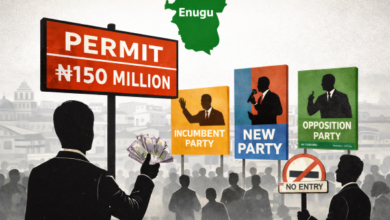Why Tribunal affirmed Okpebholo as Edo Gov., dismissed PDP, Ighodalo’s petition

The Edo Governorship Election Petition Tribunal on Wednesday dismissed the petition filed by the Peoples Democratic Party (PDP) and its governorship candidate, Mr Asue Ighodalo, challenging the outcome of the Sept. 21 governorship election.
Delivering judgment in Abuja, the tribunal upheld the election of Gov. Monday Okpebholo of the All Progressives Congress (APC).
Okpebholo was declared winner by the Independent National Electoral Commission (INEC), with 291,667 votes; defeating Ighodalo, who polled 247,655 votes.
The three-member tribunal dismissed the petitioners’ petition on the grounds that they failed to prove their allegation of over-voting.
The tribunal also held that the petitioners failed to call competent witnesses to speak to documentary evidence they brought to the tribunal.
This, the Justices said, amounted to dumping of documents on the tribunal, as they could not prove how the documents led to their allegations of over-voting.
The tribunal unanimously held that the petitioners failed to prove their case of over voting in 320 polling units across the 18 Local Government Areas of the state, where election held.
Chairman of the tribunal, Justice Wilfred Kpochi, who delivered the lead judgment, said that the claims of non-compliance with the Electoral Act, 2022 was not proved, because the petitioners failed to call competent witnesses to substantiate their claim.
The PDP and Ighodalo had called 19 witnesses including collation agents, and a research expert; and tendered polling units results; collation results; the BVAS and other sensitive materials to buttress their claim of over-voting.
“Where no evidence is made, it is not the duty of the tribunal to scrutinise the documents for the petitioners,” Kpochi said.
The tribunal further held that to prove allegations of over voting, a petitioner must tender three valid documents which are: Voter’s Register, BVAS and the form EC8A (polling unit result).
“How do you prove over voting if you don’t know the number of the registered voters? the chairman said.
The tribunal subsequently dismissed the petition which accused the governor and his party of non-compliance with electoral laws, as well as over voting.
BRANDECONOMY reports that INEC had declared Okpebholo of the All Progressives Congress (APC) winner of the Sept. 21 governorship election.
The electoral umpire said it reached its decision based on the grounds that Okpebholo scored majority of votes cast in the election.
Miffed by the declaration of INEC, the PDP and Ighodalo dragged the governor and his party to the tribunal, seeking to nullify the election on grounds of non-compliance with the electoral laws and over voting.
The tribunal’s decision effectively affirms Okpebholo’s victory and brings an end to the petition filed by the PDP and its candidate.
The tribunal had earlier dismissed the petitions filed by Action Alliance and its candidate, as well as Accord Party and its candidate, for being frivolous and lacking in merit.












